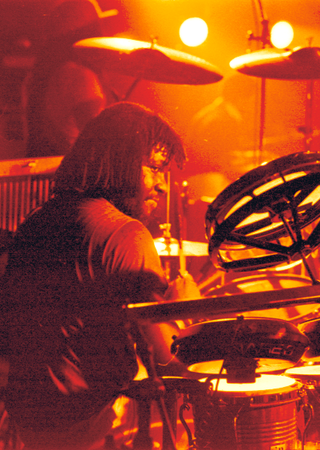The United Kingdom held a national preselection to choose the song that would go to the Eurovision Song Contest 1965. It was held on 29 January 1965 and presented by David Jacobs.

Robert Wyatt is a retired English musician. A founding member of the influential Canterbury scene bands Soft Machine and Matching Mole, he was initially a kit drummer and singer before becoming paraplegic following an accidental fall from a window in 1973, which led him to abandon band work, explore other instruments, and begin a forty-year solo career.

Ernest Ranglin is a Jamaican guitarist and composer who established his career while working as a session guitarist and music director for various Jamaican record labels including Studio One and Island Records. Ranglin played guitar on many early ska recordings and helped create the rhythmic guitar style that defined the form. Ranglin has worked with Theophilus Beckford, Jimmy Cliff, Monty Alexander, Prince Buster, the Skatalites, Bob Marley and the Eric Deans Orchestra. He is noted for a chordal and rhythmic approach that blends jazz, mento and reggae with percussive guitar solos incorporating rhythm 'n' blues and jazz inflections.
Rexton Rawlston Fernando Gordon OD, better known by his stage name Shabba Ranks, is a Jamaican dancehall musician. In the late 1980s and early 1990s, he was one of the most popular Jamaican musicians in the world. Throughout his prominence in his home country as a dancehall artist, he gained popularity in North America with his studio album, Just Reality, in 1990. He released two studio albums, As Raw as Ever and X-tra Naked, which both won a Grammy Award as Best Reggae Album in 1992 and 1993, respectively. He is notoriously popular for "Mr. Loverman" and "Ting-A-Ling", which were globally acclaimed and deemed his signature songs.

Kenneth George Boothe OD is a Jamaican vocalist known for his distinctive vibrato and timbre. Boothe achieved an international reputation as one of Jamaica's finest vocalists through a series of crossover hits that appealed to both reggae fans and mainstream audiences.

Sly and Robbie were a prolific Jamaican rhythm section and production duo, associated primarily with the reggae and dub genres. Drummer Sly Dunbar and bassist Robbie Shakespeare teamed up in the mid-1970s after establishing themselves separately in Jamaica as professional musicians. Shakespeare died in December 2021 following kidney surgery.
People from the Caribbean have made significant contributions to British Black music for many generations.

Edmond Montague Grant is a Guyanese-British singer, songwriter and multi-instrumentalist, known for his genre-blending sound; his music has blended elements of pop, British rock, soul, funk, reggae, electronic music, African polyrhythms, and Latin music genres such as samba, among many others. In addition to this, he also helped to pioneer the genre of "Ringbang". He was a founding member of the Equals, one of the United Kingdom's first racially mixed pop groups who are best remembered for their million-selling UK chart-topper, the Grant-penned "Baby, Come Back".

Sandie is the debut studio album by the British pop singer Sandie Shaw. Released in February 1965 on the Pye label, it was her only original album to enter the UK Albums Chart and peaked at Number 3. In the few months prior to the album's release, Shaw had scored two major hits with the Bacharach/David-penned "(There's) Always Something There to Remind Me" and Chris Andrews's "Girl Don't Come"; although neither track was included on this album.

The Golden Hits of Sandie Shaw is a compilation album by the British singer Sandie Shaw. Released in April 1966 by Pye Records on their budget Golden Guinea label, it contains all of the "A" sides and "B" sides of all her UK chart singles from 1964 to the end of 1965, which was technically all of her singles apart from her first which had failed to make an impression on the chart. The Golden Hits compilation did not enter the UK Albums Chart. This album has never been released on CD.

Hello Angel is the seventh and final studio album by British singer Sandie Shaw, released in 1988.

Rock Bottom is the second solo album by former Soft Machine drummer Robert Wyatt. It was released on 26 July 1974 by Virgin Records. The album was produced by Pink Floyd's drummer Nick Mason, and was recorded following a 1973 accident which left Wyatt a paraplegic. He enlisted musicians including Ivor Cutler, Hugh Hopper, Richard Sinclair, Laurie Allan, Mike Oldfield and Fred Frith in the recording.

Christopher Frederick Andrews is an English-German singer-songwriter whose musical career started in the late 1950s.

"Yester-Me, Yester-You, Yesterday" is a 1969 soul song written by Ron Miller and Bryan Wells, released by American Motown singer-songwriter-musician Stevie Wonder on the album My Cherie Amour (1969). The song continued Wonder's success on the pop charts. It reached number 7 on the pop singles chart and become Wonder's ninth Top 10 single of the 1960s. The single fared even better on the UK singles chart where it reached number 2 in November 1969, and at that time, it was Wonder's biggest UK hit.
"Girl Don't Come" is a song, written by Chris Andrews that was a No. 3 UK hit in the UK Singles Chart for Sandie Shaw in 1964–65.
"Long Live Love" is a Chris Andrews composition which, in 1965, gained Sandie Shaw the second of her three UK number one hit singles.
"Who Am I (Sim Simma)", or simply "Who Am I", is a reggae single released by dancehall artist Beenie Man in 1998. It is the second track on his album Many Moods of Moses released in 1997.

"It's Not Unusual" is a song written by Les Reed and Gordon Mills, first recorded by a then-unknown Tom Jones, after it had first been offered to Sandie Shaw. He intended it as a demo for her, but when she heard it she was so impressed with his delivery that she recommended he sing it instead.
The Paramounts were an English beat group based in Southend-on-Sea, Essex. They had one hit single with their cover version of "Poison Ivy", which reached No. 35 on the UK Singles Chart in 1964, but are primarily known as the forerunner to Procol Harum.

Sandie Shaw is a English pop singer. One of the most successful British female singers of the 1960s, she had three UK number one singles with "(There's) Always Something There to Remind Me" (1964), "Long Live Love" (1965) and "Puppet on a String" (1967). With the latter, she became the first British entry to win the Eurovision Song Contest. She returned to the UK Top 40, for the first time in 15 years, with her 1984 cover of the Smiths song "Hand in Glove". Shaw retired from the music industry in 2014.













